必修一Unit5 Nelson Mandela教案
林素芬人教版必修一Unit 5 Nelson Mandela单元教案
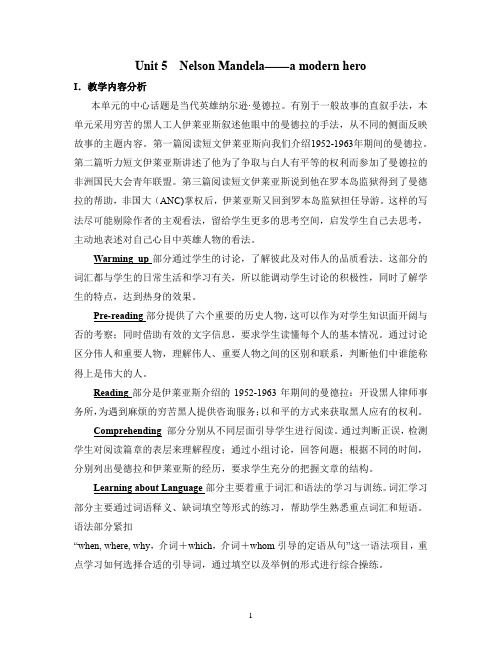
Unit 5 Nelson Mandela——a modern heroI.教学内容分析本单元的中心话题是当代英雄纳尔逊·曼德拉。
有别于一般故事的直叙手法,本单元采用穷苦的黑人工人伊莱亚斯叙述他眼中的曼德拉的手法,从不同的侧面反映故事的主题内容。
第一篇阅读短文伊莱亚斯向我们介绍1952-1963年期间的曼德拉。
第二篇听力短文伊莱亚斯讲述了他为了争取与白人有平等的权利而参加了曼德拉的非洲国民大会青年联盟。
第三篇阅读短文伊莱亚斯说到他在罗本岛监狱得到了曼德拉的帮助,非国大(ANC)掌权后,伊莱亚斯又回到罗本岛监狱担任导游。
这样的写法尽可能剔除作者的主观看法,留给学生更多的思考空间,启发学生自己去思考,主动地表述对自己心目中英雄人物的看法。
Warming up部分通过学生的讨论,了解彼此及对伟人的品质看法。
这部分的词汇都与学生的日常生活和学习有关,所以能调动学生讨论的积极性,同时了解学生的特点,达到热身的效果。
Pre-reading部分提供了六个重要的历史人物,这可以作为对学生知识面开阔与否的考察;同时借助有效的文字信息,要求学生读懂每个人的基本情况。
通过讨论区分伟人和重要人物,理解伟人、重要人物之间的区别和联系,判断他们中谁能称得上是伟大的人。
Reading部分是伊莱亚斯介绍的1952-1963年期间的曼德拉:开设黑人律师事务所,为遇到麻烦的穷苦黑人提供咨询服务;以和平的方式来获取黑人应有的权利。
Comprehending部分分别从不同层面引导学生进行阅读。
通过判断正误,检测学生对阅读篇章的表层来理解程度;通过小组讨论,回答问题;根据不同的时间,分别列出曼德拉和伊莱亚斯的经历,要求学生充分的把握文章的结构。
Learning about Language部分主要着重于词汇和语法的学习与训练。
词汇学习部分主要通过词语释义、缺词填空等形式的练习,帮助学生熟悉重点词汇和短语。
语法部分紧扣“when, where, why,介词+which,介词+whom引导的定语从句”这一语法项目,重点学习如何选择合适的引导词,通过填空以及举例的形式进行综合操练。
人教版高中英语必修一 教案: unit 5 Nelson Mandela--a modern hero Reading
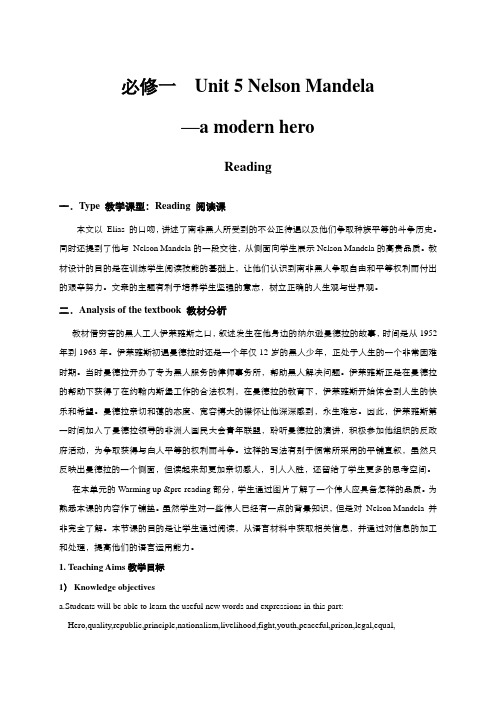
必修一Unit 5 Nelson Mandela—a modern heroReading一.Type 教学课型:Reading 阅读课本文以Elias 的口吻,讲述了南非黑人所受到的不公正待遇以及他们争取种族平等的斗争历史。
同时还提到了他与Nelson Mandela的一段交往,从侧面向学生展示Nelson Mandela的高贵品质。
教材设计的目的是在训练学生阅读技能的基础上,让他们认识到南非黑人争取自由和平等权利而付出的艰辛努力。
文章的主题有利于培养学生坚强的意志,树立正确的人生观与世界观。
二.Analysis of the textbook 教材分析教材借穷苦的黑人工人伊莱雅斯之口,叙述发生在他身边的纳尔逊曼德拉的故事,时间是从1952年到1963年。
伊莱雅斯初遇曼德拉时还是一个年仅12岁的黑人少年,正处于人生的一个非常困难时期。
当时曼德拉开办了专为黑人服务的侓师事务所,帮助黑人解决问题。
伊莱雅斯正是在曼德拉的帮助下获得了在约翰内斯堡工作的合法权利,在曼德拉的教育下,伊莱雅斯开始体会到人生的快乐和希望。
曼德拉亲切和蔼的态度、宽容博大的襟怀让他深深感到,永生难忘。
因此,伊莱雅斯第一时间加入了曼德拉领导的非洲人国民大会青年联盟,聆听曼德拉的演讲,积极参加他组织的反政府活动,为争取获得与白人平等的权利而斗争。
这样的写法有别于惯常所采用的平铺直叙,虽然只反映出曼德拉的一个侧面,但读起来却更加亲切感人,引人入胜,还留给了学生更多的思考空间。
在本单元的Warming up &pre-reading部分,学生通过图片了解了一个伟人应具备怎样的品质。
为熟悉本课的内容作了铺垫。
虽然学生对一些伟人已经有一点的背景知识,但是对Nelson Mandela 并非完全了解。
本节课的目的是让学生通过阅读,从语言材料中获取相关信息,并通过对信息的加工和处理,提高他们的语言运用能力。
1. Teaching Aims教学目标1)Knowledge objectivesa.Students will be able to learn the useful new words and expressions in this part:Hero,quality,republic,principle,nationalism,livelihood,fight,youth,peaceful,prison,legal,equal,law,advise,continue,gold,passbook,ANC,league,stage,vote,position,accept,violence,devote,vote, guidance, blow up, in troubleb. Enable the students to read Elias’ storyc. Guide the students to know the qualities of Nelson Mandela as a great leader2) Ability objectivesa.Develop the students ’reading skills, such as fast reading ,careful reading and summarizingb.Improve the students’ comprehension ability3) Emotion objectivesa,Understand the qualities great person have in common and learn the fine qualities from themb.Develop the students’ moral quality2.Teaching important points教学重点a.Enable the students to read Elias’ story and Learn to grasp the main idea of the text.b.Enable students to talk about the fine qualities of great people,especially Nelson Mandelac.Improve the students’ reading ability3.Teaching difficult points 教学难点a.How to grasp the main idea of the text.b.How to help develop students’ reading abilityc.How to help students learn from Nelson Mandela4.Teaching methods 教学方法a.Student-centeredb.Task-based teaching method(任务型教学)c.Discussion5.Learning methods 学习方法Individual or pair work and group work6.Teaching Aids 教具准备The multimedia三.教学设计1. 总体思路本堂课的主要内容分为四大部分,Pre-reading(阅读前活动) ,while –reading(阅读中活动),post-reading(阅读后活动)以及discussion(讨论) and role play 。
Unit 5 Nelson Mandela人教版必修一unit 5 Reading 部分教学设计

高中英语必修一Unit 5 Nelson Mandela--a modern heroReading --- Elias’story知识与能力目标:阅读目标:1.知识目标After learning this passage ,students will learn the new words and useful expressions.2.能力目标Students will develop some reading skills, such as scanning( 略读), word--guessing(猜词), skimming ,careful reading(细读)and summarizing(总结) 3.情感目标After learning, students will know the qualities great people have in common and learn the fine qualities from them.课型:Reading教学重难点:1.Enable the students to read Elias’story.and understand the passage.2.Help the students know how Elias’life changed before and after he met Nelson Mendela.教学方法:Listening ,Speaking, Reading ,Writing, Discussion, Practice学法指导:Individual work, pair work and group work教学过程:Step 1.Warming upGuessing game who is Nelson Mendela.Introduce some famous people and ask students guess who they are。
最新人教版高中英语必修一unit5《nelsonmandela》全单元教案.doc
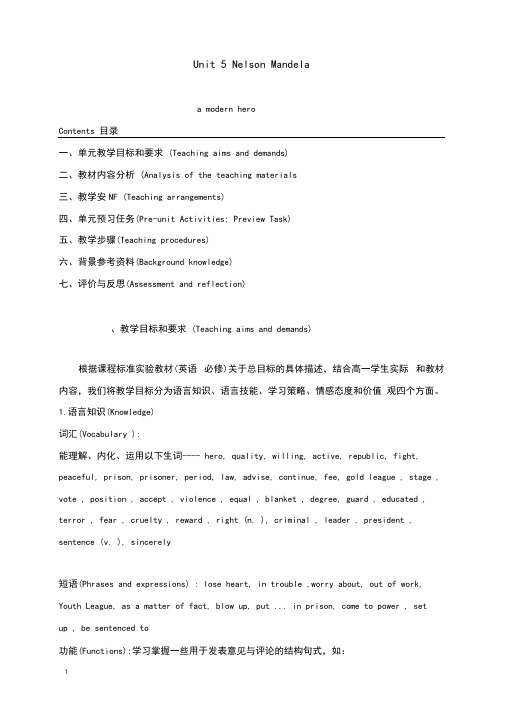
Unit 5 Nelson Mandelaa modern heroContents 目录一、单元教学目标和要求(Teaching aims and demands)二、教材内容分析 (Analysis of the teaching materials三、教学安NF (Teaching arrangements)四、单元预习任务(Pre-unit Activities: Preview Task)五、教学步骤(Teaching procedures)六、背景参考资料(Background knowledge)七、评价与反思(Assessment and reflection)、教学目标和要求(Teaching aims and demands)根据课程标准实验教材(英语必修)关于总目标的具体描述,结合高一学生实际和教材内容,我们将教学目标分为语言知识、语言技能、学习策略、情感态度和价值观四个方面。
1.语言知识(Knowledge)词汇(Vocabulary ):能理解、内化、运用以下生词---- hero, quality, willing, active, republic, fight, peaceful, prison, prisoner, period, law, advise, continue, fee, gold league , stage , vote , position , accept , violence , equal , blanket , degree, guard , educated , terror , fear , cruelty , reward , right (n. ), criminal , leader , president , sentence (v. ), sincerely短语(Phrases and expressions) : lose heart, in trouble ,worry about, out of work, Youth League, as a matter of fact, blow up, put ... in prison, come to power , setup , be sentenced to功能(Functions):学习掌握一些用于发表意见与评论的结构句式,如:1. 发表意见(Giving opinions )Why do you think so? What do you think of …? What's you opinion?agree / don't agree. I think / don't think .... I prefer .... In myopinion ....I'm afraid ....2.评论(Making comments)Good idea! That's an excellent idea .语法(Grammar):定语从句(II )(由where, when, why, 介词+ which, 介词+ whom引导的定语从句)The school where I studied only two years was three kilometres awayThis was a time when you had got to have a passbook to live in JohannesburgThe reason why I got a job was because of my hard work .•••we were put in a position in which we had either to accept we were less important, or fight the Government .The person to whomyou should be grateful for a peaceful South Africa is Nelson Mandela.扩展词汇:negative(消极的),heroine(女主角,女主人公),unwilling(不情愿的),nation(国家,民族),sacrifice(牺牲),realize (认识到),give up (放弃),riches (财富),Bible (圣经),revolution (革命),career (职业),equality (平等),fairness(公平),conflict (冲突),biography (自传),beliefs (信仰),Christianity (基督教),religion (宗教),priests (牧师),version (翻译),readable (易读的),adventure (冒险),scholar (学者),sympathy (同情),,campaign (从事活动),communist (共产主义者),injustice (不公平),oppose (反对),pilot(飞行员) , boycott (联合抵制)2.语言技能(Skills)听:在本单元的课文及练习册听力教学中,能听懂人物和事件以及它们的关系,能抓住所听语段中的关键词,正确理解话语间的逻辑关系。
高中英语Unit5NelsonMandela教案新人教版必修1

Unit 5 Nelson Mandela—a modern hero随堂练习1、Read these statements. Tell whether they are true or false and why.True False①Elias met Nelson Mandela at school. □ □√②Nelson Mandela was a black lawyer. □√□③Elias was unable to read or write because he was lazy. □ □√④Nelson Mandela helped him keep his job. □√□⑤Eli as was happy blowing up government buildings. □ □√⑥Nelson Mandela believed that black people were being treated√as well as white people in South Africa. □ □⑦Nelson Mandela thought violence was a good way to help black√people. □ □⑧The government were happy with Nelson Mandela and the ANC. □ □√2、Now make a timeline of Elias’life un til he met Nelson Mandela, using the reading to help you. Work out the year in which he was born and then fit in the otherevents in his till he was fourteen.—1940 Elias was born—1942—1944—1946 Elias began school—1948 Elias left school—1950—1952 Nelson Mandela opened his law firm—1954课堂笔记1、The time when I first met Nelson Mandela, was a very difficult period of my life. 第一次见到纳尔逊·曼德拉的时候是在我一生中非常艰难的时期。
高中人教版英语必修1《Unit 5 Nelson Mandela---a modern hero》精品单元教案

Unit 5 Nelson Mandela---a modern heroWarming Up, Pre-reading and Reading一、Teaching Aims教学目标Teaching containsFrom page 33-351.Target language语言目标a.重点词汇和短语period, advise…on, continue, fee, fare, gold, be worried about, out of work, stage, vote, posi tion, accept, violence, as a matter of fact, blow up, put in prison, equal, make + O + adj, imagine, in one way, blankets, degree, allow sb to do, guard, stop from, educated, come to power, beg for, terror, fear, cruelty, reward, rights, be proud to do.b.重点句子It was in 1952 and he had opened a black law firm to advise poor black people on their problems. P34 After trying hard, I got a job in a gold mine. P34He told me how to get the correct papers so I could in Johannesburg. P342.Ability goals 能力目标Talk about great peopleExpress your points of viewUse the Attributive Clause with prep. Or the Relative Adverbs: Where, when, and whyLearn to write a passage about a great person.3.Learning ability goals 学能目标Improve the Ss’ abilities of listening and speaking.Enable the Ss to understand the important events completely.Enable the Ss to get a good mastery of some words and expressions.Enable the Ss to learn about the expressions of some famous peopleEnable the students to learn how to talk about the famous great people.二、. Teaching important points 教学重点Understand the real meaning of the hero / heroineWho is your hero / heroine ?Why do you like him / her so much ?三、Teaching difficult points 教学难点The Attributive Clause ( 2 ) --- where, when, why.Use the Attributive Clause with prep. Or the Relative Adverbs: Where, when, and whyLearn to write a passage about a great person.四、Teaching methods 教学方法Fast reading and careful readingAsking and answering activity to check the student’s understanding of the text.Individual, pair or group work to finish each otherDiscussion五、Teaching aids 教具准备Slide projector, Tape-recorder, computer六、Teaching procedures and ways 教学过程Step 1 RevisionGo over what has been learned in the last period.Who do you admire greatly? Yao ming Luxun NewtonStep 2 Background about some charactersWilliam TyndaleWilliam Tyndale ( 1484-1536 ) was a 16th century priest and scholar who translated the Bible into an early form of Modern English. Although numerous partial and complete English translations had been made from the 7th century onward, Tyndale’s was the first to take advantage of the new medium of print, which allowed for its wide distribution. Beside translating the Bible, he also held and published views which were considered heretical, first by the Catholic Church, and later by the Church of England which was established by Henry VIII. Because his Bible translation also include notes and commentary promoting these views. His translation was banned by the authorities, and he himself was burned at the stake in 1536, at the instigation of agents of Henry VIII and the Anglican Church .GandhiGandhi ( Oct,2 1869- Jan, 30, 1948 ) was one of the founding fathers of the modern Indian state and an influential advocate o f pacifism as a means of revolution. He helped bring about India’s independence from British rule, inspiring other colonial peoples to work for their own independence and ultimately dismantle the British Empire and replace it with the Commonwealth .His principle of satyagraha , often roughly translated as “ way of truth ”, has inspired generations of democratic anti-racist activities including Martin Luther King , Jr and Nelson Mandela . He often stated his values were simple: truth and non –violence.Neil Alden ArmstrongNeil Alden Armstrong ( Aug, 5 1930 ) is an American pilot , astronaut, and the first person to walk on the moon .He was born in Wapakoneta , Ohio and served in the Korean War as a jet fighter pilot for the US. Navy. He attended Purdue University, where he was a member of a fraternity, Phi Delta Theta , and received a Bachelor of Science degree in 1955. The he became a civilian test pilot for NASA and piloted the 4000 mi/h X-15 rocket plane. From 1960 to 1962 he was a pilot involved in the cancelled U.S During the actual mission, he took manual control of the Lunar Module Eagle and piloted it away from a rocky area to a safe landing. Several hours later he climbed out of the LM and became the first person to flub line on the moon, with the w ords “That’s one small step for a man, one giant leap for mankind.”Abraham LincolnPresident Abraham Lincoln, the sixteenth president of the United States (1861- 1865 )Albert EinsteinAlbert Einstein is one of the greatest scientists of the century in the world. He was born in Germany. His theory in physics helped the world to know more about the universe. So he was given the Noble Prize in 1921. However , in 1930s , because of Hitler’s rule, he was forced to leave his homeland and go to the U.S.A. He lived the rest of his life there and died in 1955, at the age of 76.Marie CurieMarie Curie ( 1867- 1934 ) , Polish scientist , ws born in Warsaw , on Nov 7th , 1867 , and died in France, on 4th July 1934. She graduated in Mathematics and Physical Science and got married in 1895 with the French physicist , Pierre Curie. During her work , the Curie couple discovered a new radioactive element named polonium in honor to Marie’s homeland . Together with Becquerel, she obtained the Noble Prize for Physics in 1903. She founded the Radium Institute of Paris , and was the main responsible until her death. In 1911 she was awarded the Noble Prize for Chemistry.Sun YatwenSun Yatwen ( Sun Yixian , Sun Zhongshan , SunWen 1866- 1925 ) is considered the founding father of modern China. Born in a peasant family . He was accorded the appellant of “ pioneer of the revolution ”Qian XuesenHe is widely considered as the “ father of the Chinese space program ”. As one of the leading rocket engineers at the California Institute of Technology. In the 1990s , he , who had worked on top-secret projects all his life, become one of the most well – known intellectuals.Step 3 ReadingGet the students to comprehend the passage quickly and accurately, andmeanwhile help the Ss to form a good habit of reading. Read the passage on P34 toget the answers to Part 1 and Part 2 of comprehending.Silent readingRead the text through in 3 mins, and then try to find the main idea of the text:It tells us sth. that happened before Read the passage on Page 34 to get the answers to Part 1 and Part 2 of comprehending. ( 5 mins )Understanding ideas1.Why did Elias support Nelson Mandela?2.What problems did Elias have?3.Why did he support violence when he did not agree with it?4.What would you have done if you were Elias?Discussion of ideasHere are some possible questions students could talk about:1.Why did the white people not treat black people fairly in South Africa?2.How do you think the white people stopped the black people from being treated fairly?3.Is it right for some people in one country to treat other people in the same country differently? Give areasonRead the text again and summarize the main idea of each part. (work in group of four). Ask the Ss to pay attention to the first sentence of each paragraph.How many parts can this text be divided into? (2 parts )Give the main idea of each paragraphPart 1: (Para. 1----2 ) The life of Elias’ life before he met Nelson Mandela.Part 2: ( Para. 3 and 5) The change of Elias life after he met Nelson Mandela and what Mandela did.Do Exercises 1, 2 and 3Careful studyRead the text again carefully, after that, answer the following questionsStep 4 Extensive ReadingGet the Ss to learn more about Nelson Mandela from P38Finish the related exerciseWho do you think is a great person?What do you think I should do then?Which food do you think is healthy and which is unhealthy?Choose the answer which you think is correct in the following.Are you willing to do public service work without pay?Step 5 Speaking & talkingTalk about your hero/heroineDiscuss in pairs to talk about the qualities great people have.Sa: In my opinion, a great person is someone who should be hardworking, determined, unselfish andgenerous. If he/she works hard, no matter how great the difficulty he/she meets, he/she will try to deal with it. If he/she is unselfish and generous, he/she will help others without pay and get respect from others. If he/she is determined /she will never lose heart when he/she is in trouble.Sb: As far as I know, a great person is someone who should be kind, brave, determined and confident. As a great person, he first should be kind-hearted. Only when he is kindhearted, he can help others when they are in trouble. Second, he should be brave. When he is facing danger, fear or terror, he would no be afraid. And he should be determined and confident. When he has confidence he will never lose heart in front of failure.T: I think both of you said are very good, thank you.Step 6 Language points1.be willing to do sthbe willing for sb. to do sth.will n. 意志, 意愿wish n. 心愿, 愿望I’m willing to help you.I’m quite willing for your brother to join us.Where there is a will, there is a way.It’s my best wish to you !2.Do you easily lose heart when you are in trouble?lose heart ( 不可数) 灰心, 泄气los e one’s heart to 爱上, 喜欢Please don’t lose heart, you still have more chances.She lost her heart to him as soon as she saw the handsome soldier.at heart 从内心来说heart and soul 全心全意break one’s heart 心碎put one’s heart into 把全部心思放在learn / know by heart记熟3.in troubleask for trouble 自寻麻烦make trouble 制造麻烦take trouble to do sth. 费心做某事get into trouble 遇到麻烦have trouble (in) doing sth. 做某事有困难save / spare trouble 省事1) He never came except when he is __________ ( 有麻烦)2) Don’t imagine that you’re the only person _________ ( 不幸)3) The boy _______ ( 出事了) when he left home to live in London.4) That’s none of your business. Please don’t _______ (自寻麻烦)Keys:1. in trouble2. in trouble3. got into trouble 4 ask for trouble4. he fought against the German Nazis and Japanese invaders during World Warfight +n. 与------ 作战/ 打架fight for 为了----- 而战fight against 与------作战/ 斗争fight with 与------作战/ 并肩作战fight back 还击, 忍住fight a battle. 战斗fight one’s way b ack ( out ) 费很大劲恢复, 打回去They told the workers to fight for their rights.We will have to fight against difficulties.If the enemy comes, we’ll fight back.5.He gave up a rich life for his ideas and fought for his country to be free from the UK in apeaceful way.give up 放弃give in 让步She has given up her life to nursing the sick.Don’t give up halfway.You can’t win the game, so you may as well give in.6.He fought for the black people and was in prison for thirty years.be in prison 在狱中go to prison 入狱put ----- in prisonsend ---- to prisonthrow ---- into prison 把----- 投入监狱be taken to prison 被关进监狱They broke into prison and set free the soldiers who had been imprisoned.He has thrown in prison for five years and you may see him at home nest year.注意: 以上短语prison前不带冠词,若表示在监狱工作或去办事,就要加冠词7….only then did we decide to answer violence with violence.当修饰状语位于句首时, 句子采用部分倒装的结构,而修饰主语时句子不用.Only by practicing a few hours every day wil l you be be able to master English.Only when the war was over was he able to return homeOnly in this way can you hope to make improvement in the operating system.8.advise vt.advise + n.advise sb. to doadvise doingadvise sb. on sth.advise + wh- + to doadvise + that ( should ) + do that-----a piece of advice1. We are often advised _____ notes in class, but few do so.A. takingB. takeC. to takeD. took2. My sister advised me that I ______ accept the job.A. wouldB. mightC. couldD. should3. The old man often advised the young workers on ______ the machine and they learned quickly.A. to operateB. how operateC. how operatingD. how to operate4. I advised _____ until the right time but they wouldn’t listen .A. to waitB. waitingC. waitedD. on waitKeys : CDDB9.We choose to attack the law.choose + n . 选中choose from / between 从------选择choose sb. + as / for 选某人当-----choose sb. sth. = choose sth. for sb. 为某人选物choose + wh- + to docannot choose but do 只好做----1.Some people say that they _______ to live in the countryside.A. enjoyB. feel likeC. chooseD. don’t to2. No doubt her husband could have told her , but he didn’t ______ .A. chooseB. choose toC. choose fromD. choose to do3. There are five pairs _______ , but I’m at a loss which to buy.A. to be chosenB. to choose fromC. to chooseD. for choosingKeys : CBBStep 7 同义词比较first of all at all after allfirst of all 表示“首先,第一”。
高中英语人教版必修1 Unit5-Nelson Mandela - a modern hero完整教案
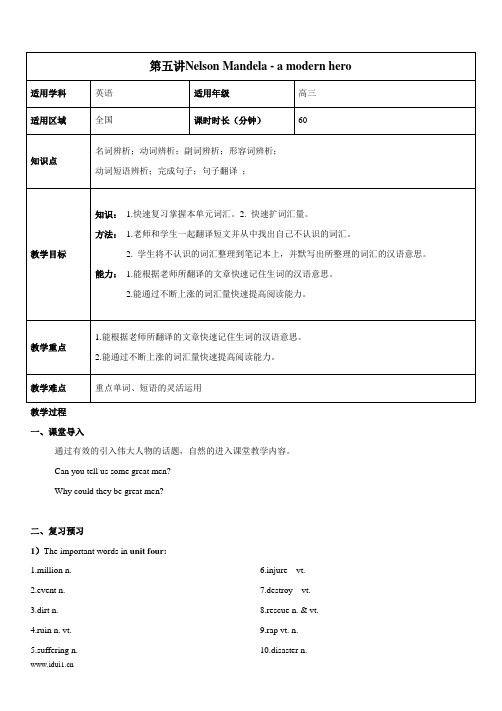
第五讲Nelson Mandela - a modern hero 适用学科英语适用年级高三适用区域全国课时时长(分钟)60知识点名词辨析;动词辨析;副词辨析;形容词辨析;动词短语辨析;完成句子;句子翻译;教学目标知识: 1.快速复习掌握本单元词汇。
2. 快速扩词汇量。
方法: 1.老师和学生一起翻译短文并从中找出自己不认识的词汇。
2. 学生将不认识的词汇整理到笔记本上,并默写出所整理的词汇的汉语意思。
能力: 1.能根据老师所翻译的文章快速记住生词的汉语意思。
2.能通过不断上涨的词汇量快速提高阅读能力。
教学重点1.能根据老师所翻译的文章快速记住生词的汉语意思。
2.能通过不断上涨的词汇量快速提高阅读能力。
教学难点重点单词、短语的灵活运用教学过程一、课堂导入通过有效的引入伟大人物的话题,自然的进入课堂教学内容。
Can you tell us some great men?Why could they be great men?二、复习预习1)The important words in unit four:lion n. __________2.event n. ___________3.dirt n. _____________4.ruin n. vt. __________5.suffering n. _________6.injure vt. _____________7.destroy vt. ____________8.rescue n. & vt. __________9.rap vt. n. _______________10.disaster n. _____________11.bury vt. _______________12.reporter n. _____________13.damage n. & vt. _________ 14.frighten vt. _____________15.express vt. n. _________【答案】1 .百万2 .事件;大事3.污垢;泥土4.废墟;毁灭5.苦难;痛苦6 .损害;伤害7.破坏;毁坏;消灭8 .援救;营救9.使陷入困境陷阱;困境10 .灾难;灾祸11.埋葬;掩埋;隐藏12 .记者13.损失;损害14 .使惊吓;吓唬15 .表示;表达快车;速递2)The important phrases in unit four:1.right away _________________2.as if ______________________3.at an end __________________4.in ruins ___________________5.dig out ____________________6.a (great) number of __________【答案】1.马上2.仿佛;好像3. 结束;终结4.废墟;毁灭5.掘出;发现6.许多;大量的三、知识讲解(一)词汇串串烧翻译下面由本单元词汇所编成的故事要求学生在翻译过程中不会的词汇用横线标出(一)The passage5.The Great President伟大的总统As the founder of the republic, the president had many good qualities. Before coming to power, he was a generous lawyer. He was willing to selflessly help everyone who turned to him. He accepted no fee to offer legal guidance and opinion s to those who were out of work or un educate d. Later, believing all mankind to be equal, he devote d himself to stopping the unfair anti-black laws. He set up the Black Youth League and was vote d to be the leader. However, though he kept peaceful principle s without violence and terror, his mean enemies still blew up his house and attack ed his relative s, and he himself couldn’t escape be ing sentenced to 30 years in prison.Not fearing of the prison guards’ cruelty, he kept active and beg ged no mercy from them. As a matter of fact, he was always hopeful and never lost heart during the stage even though he was in trouble.Finally, people reward ed him with the leader’s position and a gold blanket.作为共和国的创始人,这位总统具备许多的优秀品质。
人教版高中英语必修一 Unit 5 Nelson Mandela-a modern hero 教案

教学设计中学英语题目:Unit 5 Nelson Mandela-a modern hero(reading)Teaching Plan for ELIAS’STORYModule 1 Unit 5Nelson Mandela-a modern heroReading-ELIAS’ STORY一.Type 教学课型:Reading 阅读课本文以Elias 的口吻,讲述了南非黑人所受到的不公正待遇以及他们争取种族平等的斗争历史。
同时还提到了他与Nelson Mandela的一段交往,从侧面向学生展示Nelson Mandela的高贵品质。
教材设计的目的是在训练学生阅读技能的基础上,让他们认识到南非黑人争取自由和平等权利而付出的艰辛努力。
文章的主题有利于培养学生坚强的意志,树立正确的人生观与世界观。
二.Analysis of the textbook 教材分析教材借穷苦的黑人工人伊莱雅斯之口,叙述发生在他身边的纳尔逊曼德拉的故事,时间是从1952年到1963年。
伊莱雅斯初遇曼德拉时还是一个年仅12岁的黑人少年,正处于人生的一个非常困难时期。
当时曼德拉开办了专为黑人服务的侓师事务所,帮助黑人解决问题。
伊莱雅斯正是在曼德拉的帮助下获得了在约翰内斯堡工作的合法权利,在曼德拉的教育下,伊莱雅斯开始体会到人生的快乐和希望。
曼德拉亲切和蔼的态度、宽容博大的襟怀让他深深感到,永生难忘。
因此,伊莱雅斯第一时间加入了曼德拉领导的非洲人国民大会青年联盟,聆听曼德拉的演讲,积极参加他组织的反政府活动,为争取获得与白人平等的权利而斗争。
这样的写法有别于惯常所采用的平铺直叙,虽然只反映出曼德拉的一个侧面,但读起来却更加亲切感人,引人入胜,还留给了学生更多的思考空间。
在本单元的Warming up &pre-reading部分,学生通过图片了解了一个伟人应具备怎样的品质。
为熟悉本课的内容作了铺垫。
虽然学生对一些伟人已经有一点的背景知识,但是对Nelson Mandela 并非完全了解。
人教版高中英语必修一教案Unit 5 Nelson Mandela (含答案)
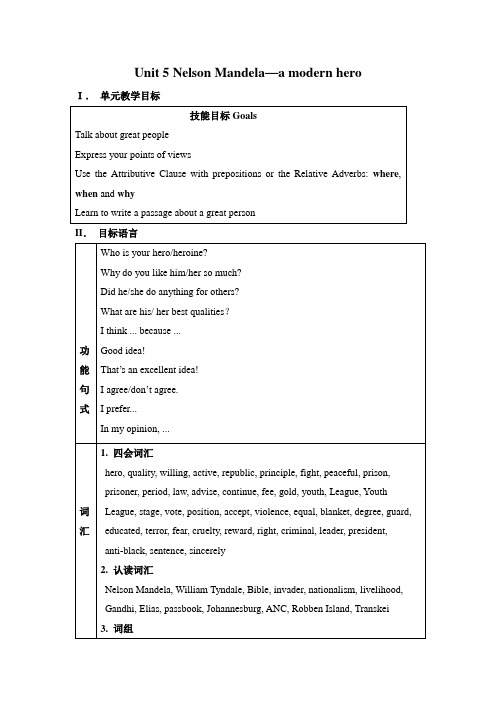
Unit 5 Nelson Mandela—a modern hero I.单元教学目标II.目标语言III. 教材分析和教材重组I. 教材分析本单元以Nelson Mandela —— a modern hero 为话题,目的在于使学生了解一个伟大的人应具备怎样的品质,学会表达自己的观点,并用所学的句型来描写一个伟人。
1.1 Warming Up列出一些形容词让学生判断一下哪些可以用来描述伟大的人,一个伟大的人应具备怎样的品质。
1.2 Pre-reading给学生提供了六个名人的图片,要求利用图片下面标注的人物的重要事迹以及学生对他们的了解,来判断这六个人谁是伟人,谁是重要的人但不是伟人。
1.3 Reading介绍Elias的生平,向学生展示Nelson Mandela是一个怎样的人。
这是一篇记叙文,让学生学会利用时间顺序描述一个人一生的主要活动。
1.4 Comprehending练习1和3帮助学生利用判断正误和时间顺序来整体理解课文。
练习2和4要求学生进一步了解课文细节。
1.5 Learning about Language分词汇和语法两部分。
其中Discovery useful words and expressions是根据课文语境在运用中掌握词汇,Grammar是有关关系副词where, when, why以及“介词+关系代词”引导定语从句的用法,并通过练习加以巩固。
1.6 Using Language分为三部分,一是Listening,练习听力可配合P72的Listening Task进行。
二是Reading,这也是一篇精读文章,更详细地了解曼德拉。
三是Writing,要求利用时间顺序简要地描述一个人。
2. 教材重组2.1 因本教材重点强调的是阅读能力,故将Reading, Comprehending,Using Language 中的Reading合在一起设计成一节“阅读课”(一)(精读课)。
英语优秀教案(人教新课标版):必修1(Unit5 Nelson Mandela—a modern h
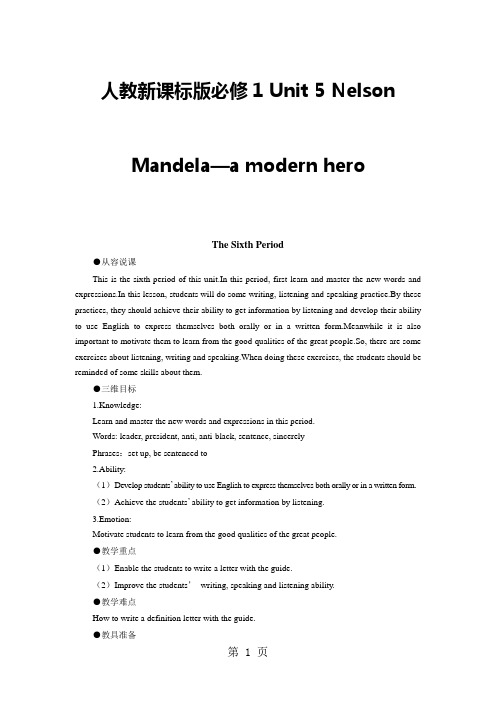
Motivate students to learn from the good qualities of the great people.
●教学重点
(1)Enable the students to write a letter with the guide.
(2)Improve the students’writing, speaking and listening ability.
S1: Let me try.Although Mr.Mandela was one of the leaders who called on black people to blow up some government buildings,he had no choice but to do that.He said they broke the law in a way which was peaceful.Only when this was not allowed did they decide to answer violence with violence.
T: So you mean the government forced him to break the law, so it is necessary to set him free.Good.Another reason?
S2:In my opinion,it is natural for Mr.Mandela to encourage violence against anti-black law.At that time,there were a lot of laws stopping the blacks’rights and progress.The black people reached a stage where they have almost no rights at all.Black people had no vote and could not choose who ruled them.The parts of town where they were sent to live were decided by white people.They could not get jobs they wanted.The places where they were sent to live were the poorest areas in South Africa.No one could grow food there.As a matter of fact,black people did not like violence.But they knew it was to realize their dream of making black and white people equal.
高中英语必修一人教版:Unit+5+Nelson+Mandela+教学案.doc

必修一Unit5 Nelson Mandela班级_______________ 姓名_______________小组号_______________【学习目标】1.学生在早读读背单词基础上,能够熟练读出背出本单元考纲词汇及短语。
2.学生在背诵课本词汇的基础上,能够默写出考纲词汇及其相关变形。
3.学生通过熟读例句,能够总结出重点字词的用法并翻译出句子。
【重点难点】1.重点熟练记忆课本词汇及相关短语。
2.难点:能运用所学单词和短语写出正确的句子。
【考点分析】能够运用所学重点单词、短语写出完整正确的句子【学情分析】学生通过自主学习和小组讨论能够总结出词汇的相关用法,并能完成英译汉的句子翻译,有可能注意不到小的语法细节。
【导学流程】自主学习内容一回顾旧知本单元重点单词和语法二基础知识感知:●重点单词1.____________n.质量;品质;性质2.____________adj.积极的;活跃的→actively adv.积极地→activity n.活动3.____________vt.(与to连用)献身;专心于→devoted adj.忠实的,深爱的→devotion n.奉献4.____________ vt.建立;建设5.____________ n.法则;原则;原理6.____________ adj.和平的;平静的;安宁的→peace n.和平7.____________adj.法律的;依照法律的→illegal(反义词)8.____________ adj.怀有希望的;有希望的→hopeless(反义词)→hope n. & v.希望9.____________ n.青年;青年时期10.____________ vt. & vi.投票;选举n.投票;选票;表决三、探究问题1.quality n. 质量;品质;性质,特征quantity n. 数量be of good/bad quality 好/坏的品质be of high/poor quality 优/劣质extra fine quality 特等first-rate quality 一等2.devote vt. (与to 连用)献身;专心于devoted adj. 热爱的;忠诚的Devote oneself/time one's life /money/energy+to sth.把……用在,doing sth.把……献给sb. be devoted to 专心致志于;忠于;很喜欢a devoted friend 一位忠实的朋友3.vote vt. & vi.投票,选举n.投票;选票;表决vote for投票赞成vote against投票反对vote on投票表决vote...down投票击败,投票否决vote through投票通过put...to the vote付诸表决,裁决提示:vote for表示“投票赞同”;vote against表示“投票反对”,类似结构还有“be for/against; fight for/against”。
人教版高中英语必修第一册 《Unit 5:Nelson Mandela 》教案
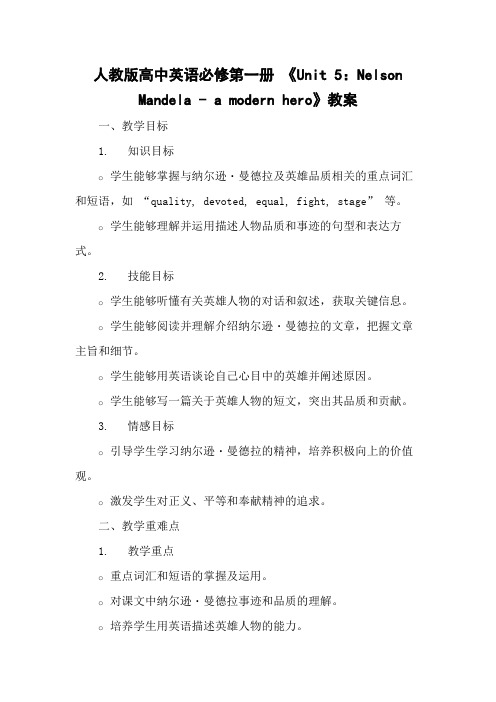
人教版高中英语必修第一册 《Unit 5:Nelson Mandela - a modern hero》教案一、教学目标1.知识目标o学生能够掌握与纳尔逊・曼德拉及英雄品质相关的重点词汇和短语,如 “quality, devoted, equal, fight, stage” 等。
o学生能够理解并运用描述人物品质和事迹的句型和表达方式。
2.技能目标o学生能够听懂有关英雄人物的对话和叙述,获取关键信息。
o学生能够阅读并理解介绍纳尔逊・曼德拉的文章,把握文章主旨和细节。
o学生能够用英语谈论自己心目中的英雄并阐述原因。
o学生能够写一篇关于英雄人物的短文,突出其品质和贡献。
3.情感目标o引导学生学习纳尔逊・曼德拉的精神,培养积极向上的价值观。
o激发学生对正义、平等和奉献精神的追求。
二、教学重难点1.教学重点o重点词汇和短语的掌握及运用。
o对课文中纳尔逊・曼德拉事迹和品质的理解。
o培养学生用英语描述英雄人物的能力。
2.教学难点o如何帮助学生深入理解纳尔逊・曼德拉的精神内涵,并能用英语准确表达。
o引导学生在写作中展现对英雄概念的深刻思考。
三、教学方法1.人物分析法:深入剖析纳尔逊・曼德拉的形象和品质。
2.故事讲述法:通过讲述曼德拉的故事,吸引学生兴趣。
3.启发式教学法:启发学生思考英雄的定义和价值。
四、教学过程(一)导入(5 分钟)1.展示纳尔逊・曼德拉的图片,提问学生是否了解他。
2.简单介绍纳尔逊・曼德拉的背景,引发学生的兴趣。
(二)词汇学习(10 分钟)1.呈现本单元的重点词汇和短语,结合曼德拉的事迹进行讲解。
2.通过词汇游戏,如猜词、接龙等,巩固词汇记忆。
(三)阅读前准备(5 分钟)1.让学生思考 “什么是英雄”,并列举一些他们认为的英雄。
2.提出问题引导学生对课文内容进行预测,如:What do you think this passage will talk about Nelson Mandela?(四)课文阅读(15 分钟)1.学生快速阅读课文,概括曼德拉的主要经历。
新人教版必修一 Unit 5 Nelson Mandela-Warming up and Reading[优秀教案]
![新人教版必修一 Unit 5 Nelson Mandela-Warming up and Reading[优秀教案]](https://img.taocdn.com/s3/m/315cf1d4a58da0116c174984.png)
Unit 5Nelson Mandela—a modern hero单元规则本单元的中心话题是当代英雄纳尔逊·曼德拉(Nelson Mandela—a modern hero),阅读、听力等所选材料通过黑人工人Elias的叙述,主要介绍了纳尔逊·曼德拉的生平事迹,语言知识和语言技能等都是围绕这一中心话题展开的。
通过对这一话题的探讨,旨在使学生了解纳尔逊·曼德拉的生平事迹,认识伟人所应具备的优秀品质,向他们学习,以提高自身的素质。
为了围绕中心话题开展听、说、读、写活动,本单元安排了八个部分:“热身(Warming Up)”“读前(Pre-reading)”“阅读(Reading)”“理解(Comprehending)”“语言学习(Learning about Language)”“语言运用(Using Language)”“小结(Summing Up)”和“学习建议(Learning Tip)”。
“热身(Warming Up)”部分利用问题的形式,要求学生分组进行活动,讨论伟人应具有的品质,引导他们注意提高自身的素质。
“读前(Pre-reading)”部分以表格的形式提供了一些重要的历史人物,要求学生读懂每个人的基本情况,并分成两人小组讨论,判断他们中谁能称得上是伟人,谁仅仅是重要的人物,并说出理由。
从学生的生活经验和兴趣出发,让学生用英语阐述自己的观点,目的是培养他们的观察能力和语言表达能力,引起他们对阅读文章的思考,为下面的阅读作好充分的准备。
“阅读(Reading)”部分Elias以第一人称向我们讲述了南非黑人所受到的不公正待遇以及他们争取种族平等的斗争情况,介绍了1952~1963 年期间的曼德拉,从侧面向学生展示了他的高贵品质。
由于学生在学习“读前(Pre-reading)”部分时已对曼德拉有了初步的了解,可先让学生列出他们感兴趣的问题或想了解的信息,然后在阅读过程中,尝试找出答案。
高中英语人教版必修1教案: unit 5 Nelson Mandela--a modern hero
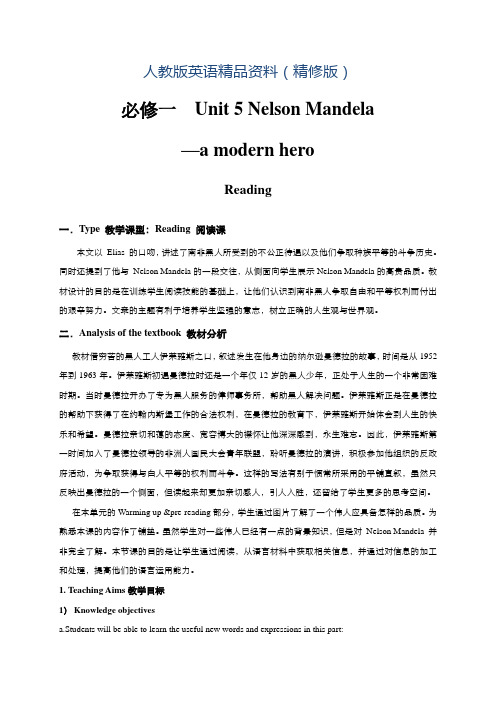
人教版英语精品资料(精修版)必修一Unit 5 Nelson Mandela—a modern heroReading一.Type 教学课型:Reading 阅读课本文以Elias 的口吻,讲述了南非黑人所受到的不公正待遇以及他们争取种族平等的斗争历史。
同时还提到了他与Nelson Mandela的一段交往,从侧面向学生展示Nelson Mandela的高贵品质。
教材设计的目的是在训练学生阅读技能的基础上,让他们认识到南非黑人争取自由和平等权利而付出的艰辛努力。
文章的主题有利于培养学生坚强的意志,树立正确的人生观与世界观。
二.Analysis of the textbook 教材分析教材借穷苦的黑人工人伊莱雅斯之口,叙述发生在他身边的纳尔逊曼德拉的故事,时间是从1952年到1963年。
伊莱雅斯初遇曼德拉时还是一个年仅12岁的黑人少年,正处于人生的一个非常困难时期。
当时曼德拉开办了专为黑人服务的侓师事务所,帮助黑人解决问题。
伊莱雅斯正是在曼德拉的帮助下获得了在约翰内斯堡工作的合法权利,在曼德拉的教育下,伊莱雅斯开始体会到人生的快乐和希望。
曼德拉亲切和蔼的态度、宽容博大的襟怀让他深深感到,永生难忘。
因此,伊莱雅斯第一时间加入了曼德拉领导的非洲人国民大会青年联盟,聆听曼德拉的演讲,积极参加他组织的反政府活动,为争取获得与白人平等的权利而斗争。
这样的写法有别于惯常所采用的平铺直叙,虽然只反映出曼德拉的一个侧面,但读起来却更加亲切感人,引人入胜,还留给了学生更多的思考空间。
在本单元的Warming up &pre-reading部分,学生通过图片了解了一个伟人应具备怎样的品质。
为熟悉本课的内容作了铺垫。
虽然学生对一些伟人已经有一点的背景知识,但是对Nelson Mandela 并非完全了解。
本节课的目的是让学生通过阅读,从语言材料中获取相关信息,并通过对信息的加工和处理,提高他们的语言运用能力。
1. Teaching Aims教学目标1)Knowledge objectivesa.Students will be able to learn the useful new words and expressions in this part:Hero,quality,republic,principle,nationalism,livelihood,fight,youth,peaceful,prison,legal,equal, law,advise,continue,gold,passbook,ANC,league,stage,vote,position,accept,violence,devote, vote, guidance, blow up, in troubleb. Enable the students to read Elias’ storyc. Guide the students to know the qualities of Nelson Mandela as a great leader2) Ability objectivesa.Develop the students ’reading skills, such as fast reading ,careful reading and summarizingb.Improve the students’ comprehension ability3) Emotion objectivesa,Understand the qualities great person have in common and learn the fine qualities from themb.Develop the students’ moral quality2.Teaching important points教学重点a.Enable the students to read Elias’ story and Learn to grasp the main idea of the text.b.Enable students to talk about the fine qualities of great people,especially Nelson Mandelac.Improve the students’ reading ability3.Teaching difficult points 教学难点a.How to grasp the main idea of the text.b.How to help develop students’ reading abilityc.How to help students learn from Nelson Mandela4.Teaching methods 教学方法a.Student-centeredb.Task-based teaching method(任务型教学)c.Discussion5.Learning methods 学习方法Individual or pair work and group work6.Teaching Aids 教具准备The multimedia三.教学设计1. 总体思路本堂课的主要内容分为四大部分,Pre-reading(阅读前活动) ,while –reading(阅读中活动),post-reading (阅读后活动)以及discussion(讨论) and role play 。
人教版高中英语必修1 Unit 5 Nelson Mandela—a modern hero 教案
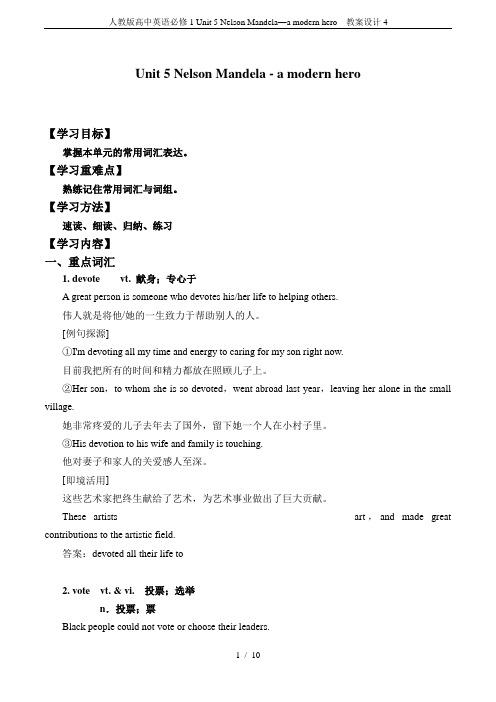
Unit 5 Nelson Mandela - a modern hero【学习目标】掌握本单元的常用词汇表达。
【学习重难点】熟练记住常用词汇与词组。
【学习方法】速读、细读、归纳、练习【学习内容】一、重点词汇1. devote vt. 献身;专心于A great person is someone who devotes his/her life to helping others.伟人就是将他/她的一生致力于帮助别人的人。
[例句探源]①I'm devoting all my time and energy to caring for my son right now.目前我把所有的时间和精力都放在照顾儿子上。
②Her son,to whom she is so devoted,went abroad last year,leaving her alone in the small village.她非常疼爱的儿子去年去了国外,留下她一个人在小村子里。
③His devotion to his wife and family is touching.他对妻子和家人的关爱感人至深。
[即境活用]这些艺术家把终生献给了艺术,为艺术事业做出了巨大贡献。
These artists ________ ________ ________ ________ ________art,and made great contributions to the artistic field.答案:devoted all their life to2. vote vt. & vi.投票;选举n.投票;票Black people could not vote or choose their leaders.当时黑人没有选举权,他们无权选择他们的领导人。
[例句探源]①Did you vote for or against her?你投了她的赞成票还是反对票?②We will listen to the arguments on both sides and then vote on it.我们将先听听双方的论点,然后再表决。
人教版必修1 Unit 5 Nelson Mandela教学设计
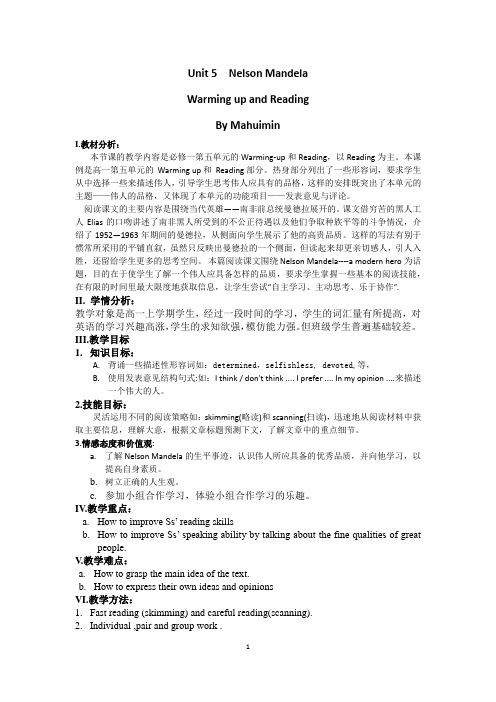
Unit 5 Nelson MandelaWarming up and ReadingBy MahuiminI.教材分析:本节课的教学内容是必修一第五单元的Warming-up和Reading,以Reading为主。
本课例是高一第五单元的Warming up 和Reading 部分。
热身部分列出了一些形容词,要求学生从中选择一些来描述伟人,引导学生思考伟人应具有的品格,这样的安排既突出了本单元的主题——伟人的品格,又体现了本单元的功能项目——发表意见与评论。
阅读课文的主要内容是围绕当代英雄——南非前总统曼德拉展开的。
课文借穷苦的黑人工人Elias的口吻讲述了南非黑人所受到的不公正待遇以及他们争取种族平等的斗争情况,介绍了1952—1963年期间的曼德拉,从侧面向学生展示了他的高贵品质。
这样的写法有别于惯常所采用的平铺直叙,虽然只反映出曼德拉的一个侧面,但读起来却更亲切感人,引人入胜,还留给学生更多的思考空间。
本篇阅读课文围绕 Nelson Mandela----a modern hero 为话题,目的在于使学生了解一个伟人应具备怎样的品质,要求学生掌握一些基本的阅读技能,在有限的时间里最大限度地获取信息,让学生尝试“自主学习、主动思考、乐于协作”.II. 学情分析:教学对象是高一上学期学生,经过一段时间的学习,学生的词汇量有所提高,对英语的学习兴趣高涨,学生的求知欲强,模仿能力强。
但班级学生普遍基础较差。
III.教学目标1.知识目标:A.背诵一些描述性形容词如:determined,selfishless, devoted,等,B.使用发表意见结构句式:如:I think / don't think .... I prefer .... In my opinion ....来描述一个伟大的人。
2.技能目标:灵活运用不同的阅读策略如:skimming(略读)和scanning(扫读),迅速地从阅读材料中获取主要信息,理解大意,根据文章标题预测下文,了解文章中的重点细节。
- 1、下载文档前请自行甄别文档内容的完整性,平台不提供额外的编辑、内容补充、找答案等附加服务。
- 2、"仅部分预览"的文档,不可在线预览部分如存在完整性等问题,可反馈申请退款(可完整预览的文档不适用该条件!)。
- 3、如文档侵犯您的权益,请联系客服反馈,我们会尽快为您处理(人工客服工作时间:9:00-18:30)。
Unit5 Nelson Mandela—a modern heroPeriod 1 warming upTeaching aims1.Knowledge:Learn and master the new words and expressions in this period.2.Ability:(1)Talk about the fine quality of great people to improve the students’ speaking ability.(3)Learn to think about a person or a situation in different respects.3.Emotion:(1)Learn about some great people and qualities they have in common.(2)Develop the students’ moral quality.Important teaching pointsHave a discussion about the fine quality of great people to improve the students’ speaking ability.Difficult pointsHow to express their own opinions and ideas.Teaching proceduresStep 1 GreetingsGreet the whole class as usual.Step 2 Lead-inLook the pictures of some famous and great people and discuss the fine qualities in them.Step 3 TalkingTalk about your hero.Who is your hero/heroine?Why do you like her/him so much?Did he/she do anything for others?What are his/her best qualities?Now you are going to look at a famous man,Bill e the skills you have learned about expressing points of view and decide whether you think he is a great man.If you have an opinion about that already,please finish this sentence.I think Bill Gates is/is not a great man because____________.Step 7 DiscussionNow you have to decide what you think of Bill Gates.He is a successful and rich man but is he a great man?Has he given up anything (not money)in his life to help other people and make things fairer in the world?Now please discuss with your partner.Step 10 SummaryStep 11 HomeworkLook up some other information about Bill Gates and his career after class.Period 2 ReadingTeaching aims1.Learn and master the new words and expressions in this period.2.Ability:(1)Enable the students to talk about Elias’ experience in English.(2)Enable the students to use the new words and expressions freely.3.Emotion:Further understand the bad experience of the blacks in South Africa.Important teaching pointsHelp the students to master the grammar:inversion with Only+adverbial. Teaching proceduresStep 1 GreetingsGreet the whole class as usual.Step 3Carefully ReadingRead the passage carefully and then choose the best answer to complete each sentence.Choose the best answer to complete each sentence.1.Elias was unhappy in the prison because____________.A.he was kept with the criminalsB.the prison guards studied with himC.he had to studyD.he could not study for a degree2.Nelson Mandela showed how good a leader he was because____________.A.he fought the guards in prisonB.he refused to let the guards study in his schoolC.he let the guards study in his school but not take the examsD.he let the guards study even though the prisoners could not take the exams3.Life for Elias was not too bad in prison because____________.A.he had to studyB.he could study with the guardsC.he wanted to studyD.he could study and get a degree4.As leader of South Africa,Nelson Mandela helped prisoners of Robben Island by________.A.giving them an educationB.giving them moneyC.putting the guards in prisonD.giving them a jobStep 5 RetellingWell,I think up to now you have known a lot of information about Elias.Now suppose you are Elias’ friend,please introduce himStep 6 Discovering useful words and expressions1.let’s look at the exercise on the screen.Please read the passage again to find words that mean the same.2.Now look at the screen.Please translate the following sentences into English using what we learned just now.(1)士兵与村民共同与敌人战斗。
(2)爸爸建议我多读英语报纸。
(3)我们应尽力阻止这种事再次发生。
(4)只有在那时,他才意识到他错了。
(5)我第一次听这首歌就喜欢它了。
(6)我昨天确实见到了Mike。
(7)他昨天没有上学的原因是他病了。
(8)我永远不会忘记我见到Mandela的那天。
Step 7 PracticeTurn to Page 70.Go through the passage and choose the words or expressions from the brackets to complete the passage below.Step 7 SummaryIn this period,we first go over the reading passage “Elias’ story” to do the oral practice.Then we deal with some important and useful language points.After that we do some consolidation exercises.Now I’m sure that you further understand the passage.Step 8 Homework1.Do WB P71.Ex 2 Translation.Preview the attributive clause.Period 3 GrammarTeaching aims1.Knowledge:(1)Revise the Attributive Clause,including the Restrictive Attributive Clause and the Non-restrictive Attributive Clause.(2)Revise the use of relative pronouns and relative adverbs.2.Ability:Expand the knowledge of the Attributive Clause.3.Emotion:Develop the students’ quality of overcoming difficulties in study.Important teaching pointsThe usage of the relative pronouns and relative adverbs.Difficult pointsHelp the students to master the way of choosing a relative pronoun or a relative adverb correctly.Teaching proceduresStep 1 GreetingsGreet the whole class as usual.Step 2 Revision and Lead-in1.He is a famous scientist.2.Who’s that girl in red?3.I’ve read all the books that you lent me.4.I have lost my pen,which I like very much.what do we call the sentences put after the noun?More exercises:Complete the sentences with suitable relatives.1.I know the reason _______________he came late.2.Do you know the woman,____________ son went to college last year?3.The house _______________colour is red is John’s.4.This is the best film _______________I’ve ever seen.5.That is the town _______________he worked in 1987.Step 3 Summarize the use of the Non-restrictive Attributive Clause The Non-restrictive Attributive Clause is a clause,which gives extra information to the antecedent.So we use a comma to interrupt the sentence.When the Non-restrictive Attributive Clause is cut off,the sentence still has a full meaning.Now look at the sentences on the screen.(Show the following on the screen.)1.I have two brothers,who are both soldiers.2.Next week,which you’ll spend in your hometown,is coming.3.I’ve tried two pairs of shoes,neither of which fits me well.Form 1:The relative pronouns Referring to Function in the clause who people subject/objectwhom people objectthat people/thing subject/objectwhich thing subject/objectwhose people/thing (of whom/which)attribute Form 2:The relative adverb Referring to Function in the clause when (=at/in/on which)time adverbial of time where (= in/at which)place adverbial of place why (= for which)reason adverbial of reason Explains the two forms separately and adds the following with examples on the screen.1.When a relative pronoun is used as a subject in the clause,the verb must agree with the antecedent in person and number.1.Those who want to go to the cinema must be at the school gate by 3:30 p.m.2.He who doesn’t reach the Great Wall is not a true man.2.When the antecedent is the structure of “one of + n.(pl.)”,the verb in the clause must be plural to agree with the plural form.However,if there is “the” or “only” before “one”,the verb in the clause must be singular,agrees with the word “one”.1.She is the only one of the girls who has been to Beijing.2.He is one of the boys who have seen the film.3.When the antecedent is a noun for time or place “when” or “where” is not always used to introduce the clause.It depends on the function of the relative word in the clause.1.The time when/that I went to Tokyo is in 1982.2.I’ll never forget the time which/that I spend at college.3.The shop that I bought is big.4.The shop where/in which I bought the book is big.Step 4 The difference between “that” and “which”B oth “that” and “which” can be used for things,but the use of them is not always the same.Let’s1.This is the second article that I have written in English.2.It is the best film that he has ever seen.3.This is the very book that I want to read.4.All that they told me surprised me.5.They talked about the teachers and schools that they had visited.6.Who is the comrade that was there?7.There is a bed in the room that is still vacant.8.Our village is no longer the place that it used to be.1.In following cases,“that” is often used.(1)After ordinal number and superlatives.(2)After the following words:all,only,little,few,much,very,none,last,just,any(thing),every(thing),some(thing),no(thing).(3)After two or more antecedents,referring to both people and things.(4)After interrogative pronouns “which” or “who”.(5)When the relative pronoun is used as a predictive in the clause.(6)When the main clause begins with “There be”.2.In following cases,“which” is always used.(1)After prepositions.(2)To introduce a Non-restrictive Attributive Clause.(3)The whole main sentence is the “antecedent” of the relative clause,and there is always a comma.Step 5 Practice1.____________ have plenty of money will help their friends.A.Those whoB.He whoC.That whoD.You who2.This is the longest train ____________ I have ever seen.A.whichB.thatC.whatD.whom3.____________ we all know,swimming is a very good sport.A.WhichB.ThatC.AsD.Who4.I shall never forget those years ____________ I lived in the farm____________ you visited last week.A.when;whereB.which;whichC.when;whichD.which;where5.The radio set ____________ last week has gone wrong.A.I bought itB.which I bought itC.I boughtD.whatI bought6.He paid the boy $10 for washing ten windows,most of ____________ hadn’t been cleaned for at least a year.A.theseB.themC.thatD.which7.The day will come ____________ the people all over the world will winliberation.A.thatB.whereC.whichD.when8.Mr Herpin is one of the foreign experts who ____________ in China.A.worksB.is workingC.are workingD.has been working9.They talked for about an hour of things and persons ____________ they remembered in the school.A.whichB.thatC.whoD.whom10.My glasses,____________ I was like a blind man,fell to the ground and broke.A.whichB.with whichC.without whichD.that。
